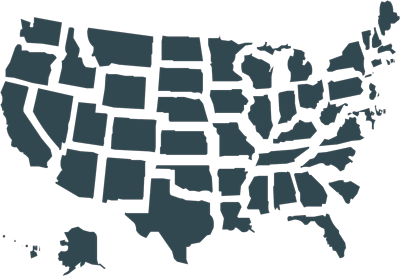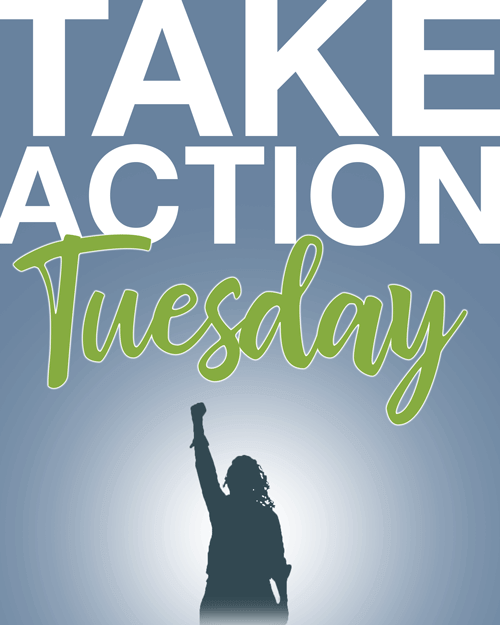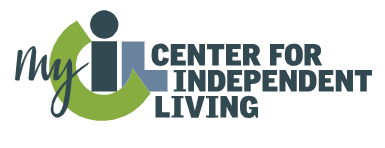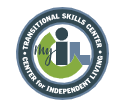Take Action Tuesday posts feature ways you can help improve the lives of people with disabilities — in your community and around the world.
From signing your name to a petition to emailing your local representative to share your stance on proposed legislature, many of these acts don’t take long but can make a real difference.
Discover what you can do on the national and state levels to improve the lives of people with disabilities.
Make a Difference Across the United States

Register Today: National Older Adult Mental Health Awareness Day 2019 on Monday, May 20, 2019 in Washington, D.C.
Register today for the National Older Adult Mental Health Awareness Day 2019 On Monday, May 20, 1–3:30 p.m. in the Great Hall of the Hubert H. Humphrey Building in Washington, D.C. The event will raise awareness of older adults’ mental health needs, promote evidence-based supports, highlight where to seek services and more.
Join the Movement: #WeAreStillWaiting to #StopTheShock on Wednesday, Apr. 24, 2019
The Autistic Self-Advocacy Network (ASAN) needs your help to spread the word that #WeAreStillWaiting to #StopTheShock. Apr. 24, 2019 marks five years since the Food and Drug Administration (FDA) banned the use of the Gradual Electronic Decelerator (GED).
The device delivers an electric shock to a person. The Judge Rotenberg Center, a Massachusetts institution for kids and adults with intellectual and developmental disabilities, still uses it. We need your help to spread the word that the FDA has yet to enforce the ban.
From taking a selfie and posting it on social media to contacting the FDA, you can join the movement. Learn more about the ways you can get involved in #WeAreStillWaiting to #StopTheShock.
Register Today: GettingHired’s Online Career Expo for Job Seekers With Disabilities on May 2, 2019
GettingHired is holding an online career expo for job seekers with disabilities. This event connects job seekers of all experience levels with nationwide employers in all industries. You’ll be able to chat online directly with employers of your choice.
Learn more about the online career expo and register today!
Mark Your Calendar: National Council on Disability Meeting on July 15–16, 2019 in Chicago, IL
The National Council on Disability is holding a council meeting on July 15–16 in Chicago, Illinois. During the meeting, which is open to the public, the Council will discuss agency priorities, policy trends and other agency business.
Learn more about the July 15–16 meeting.
Mark Your Calendar: 2019 Annual Conference on Independent Living on July 22–25, 2019 in Washington, D.C.
The National Council on Independent Living’s annual conference is July 22–25 at the Grand Hyatt in Washington, D.C. The conference will include legislative and advocacy updates, workshops and exhibits.
Learn more about the conference and register today!
Contact Your Representatives: Ask They Join Representatives Rice and Walden in Support of the Homeless Veterans’ Reintegration Program
The Homeless Veterans’ Reintegration Program (HVRP) helps homeless and at-risk veterans find employment and housing through skills training. Representatives Kathleen Rice of New York and Greg Walden of Oregon are working to get funding support in the U.S. House of Representatives for the 2020 fiscal year.
Use the pre-filled form to send a message to your representatives.
Mark Your Calendar: 2019 NDSS CARING With Congress on July 10, 2019 in Washington, D.C.
The National Down Syndrome Society (NDSS) is hosting its 15th annual CARING with Congress event on July 10, 5:30–7:30 p.m. During the event, supporters, Senators and members of Congress come together to raise money for the NDSS Research Innovation & Discovery Fund.
Learn more about the upcoming CARING event.
Register Today: Disability Rights and Parenting With a Disability Webinar on April 17, 2019, 2–3 p.m.
Robyn Powell presents a webinar to help parents with disabilities understand their rights under the Americans with Disabilities Act (ADA). Also ideal for those who support parents with disabilities, such as social workers, the webinar will cover disability rights laws and their application to family law, the child welfare system, reproductive health care and more.
Learn more about the webinar and register today!
Participate in a Survey: Workplace Tech for People With Intellectual and Developmental Disabilities
Do you work and have an intellectual or developmental disability? Does your loved one? Are you a job coach or other rehabilitation service provider for people with disabilities? Do you employ people with disabilities? If you answered yes to any of these, Georgia State University’s Center for Leadership in Disability (CLD) needs your help.
Participate in a quick online survey to inform the CLD about whether workplace technology helps people with I/DD succeed at work, how wireless technology can be used in the workplace and the barriers to using these technology resources in the workplace.
Learn more about the survey and take it today!
Participate in a Survey: Oral and General Health of Kids and Young Adults With Down Syndrome
Do you have a child (newborn to 21 years) with Down syndrome? Help researchers at New York University better understand the oral and general health of young people with Down syndrome. The anonymous online survey only takes 5 to 10 minutes to complete. Learn more and take the survey!
Register Today: Milestones National Autism Conference on June 11–12 in Cleveland
The National Autism Conference on June 11–12 at the Cleveland I-X Center will detail practical strategies for all. Keynote speakers, workshops, exhibitors and more provide invaluable resources and information for people with autism, their families and support professionals. Learn more about the conference and register today!
Contact Your Members of Congress: Urge Them to Co-Sponsor the Disability Integration Act (DIA)
The DIA, a bipartisan bill, ensures people with disabilities have the right to live in and receive services in their own homes. It prevents people from being forced to live in institutions. In short, this act is designed to ensure the full integration of people with disabilities into communities.
We need your help to get this bill before a full vote in the House of Representatives. Contact your members of Congress today and ask they co-sponsor this bill (H.R. 555 and S. 117).
Learn more about the bill and what to say about DIA to your members of Congress.
Contact Your Legislators: Ask Them to Support the Surviving Widow(er) Income Fair Treatment (SWIFT) Act of 2019
The SWIFT Act would expand the social security benefits for widow(er)s and surviving divorced spouses. It would also fix outdated and arbitrary claiming restrictions, allowing for more flexibility when claiming benefits. Contact your legislators and ask they support this bill.
Learn more about what the SWIFT Act will do for older Americans and people with disabilities.
Participate in a Paid Research Study: Universal Design Practices to Enhance Work Outcomes
The Center for Assistive Technology and Environmental Access is looking for employed people with disabilities for their research study about work environments. Specifically, they want to know how the way you get around the office or take part in meetings affects your sense of team inclusion. Based on their findings, they’ll compile actions employers can take to make workplaces more inclusive.
Learn more about this paid research study and how you can take part in it.
Give Your Input: What Issues Should the Administration for Community Living (ACL) Prioritize Relating to Elder Abuse, Neglect and Exploitation
The ACL is working on determining the focus of the Elder Justice Coordinating Council — and they need your input! What issues do you think relating to elder abuse, neglect and exploitation should the council prioritize? Your input will help them make an informed decision on their activities over the next two years. Learn more about the input they are requesting.
Submitting your thoughts and ideas is easy. Just send an email to ejcc@acl.hhs.gov with the subject line “Thoughts and Ideas.” Input is due by Sept. 30, 2019.
Sign the Petition: Help Stop Any Funding Cuts or Caps to Medicaid
Join Easterseals as they work to prevent any funding cuts or caps to Medicaid. Submit the Easterseals form to add your name to the petition.
By submitting the form, you’re telling Congress that health services are crucial to people with disabilities and their loved ones. You’re joining the fight to stop Medicaid cuts and caps that prevent people with disabilities from getting the Home and Community Based Services they need to live their best, independent lives.
Participate in the Survey: For Seniors With Disabilities
If you’re a senior with a disability, The Americans with Disabilities Act (ADA) National Network wants to hear from you.
The ADA National Network is trying to learn how people like you get your information about services you can receive and your rights under the Americans with Disabilities Act — and how you use that information.
Take the survey and help the ADA National Network improve their future outreach initiatives to better support seniors with understanding their rights and available services.
Sign the Petition: Urge the Senate to Support the Convention on the Rights of Persons with Disabilities
The Convention on the Rights of Persons with Disabilities (CRPD) is an international treaty based on The Americans with Disabilities Act (ADA). It promotes the rights and protections of people with disabilities around the world.
There are 173 ratifications around the globe for this convention. Unfortunately, the United States has failed to ratify it by five votes. Since the failed voting, it has not come to a floor vote.
Submit the form to sign your name to the petition. The petition will be delivered in person to the offices of Senators in Washington, D.C.
Share Your Story: Help Prevent Medicaid Cuts by Submitting Your Story Online About Why Receiving Home and Community Based Services Is Important
The Arc is gathering stories from people like you about why Home and Community Based Services are important. They’re using these stories to advocate for continued funding of the Medicaid program.
Fill out the form and submit your story online to join the effort to protect Medicaid and Home and Community Based Services.
Make a Difference in Your State

Colorado
Share Your Story: Help Family Voices Colorado Inform the Public on What It’s Like to Navigate the Health Care System for a Child With Special Needs
Do you have a child with special needs? Family Voices Colorado would like to hear your story about what it’s like for your family to navigate the often complex health care system.
You can call, email or share your story on their Facebook page. Learn more about how you can help Family Voices Colorado spread the word on what it’s like caring for a child with special needs.

Illinois
Submit a Form: Help Create a Sustainable Intellectual and Developmental Disabilities (ID/DD) Support System for Illinois by Using the Form to Email Your Legislators
Reach out to your Illinois legislators asking them to increase the funding for a sustainable ID/DD support system. This funding would improve the quality of services provided as well as decrease the number of people on the waiting list to receive the services.
Use this form to send a pre-written message to Illinois legislators that tell them you support increased funding for a sustainable ID/DD support system.

Oklahoma
Contact Your Legislators: Ask Legislators to Fund Home and Community Based Services
Oklahoma needs to continue funding the Home and Community Based Services people are receiving. Moreover, funding should cover those on a waiting list. In 2018, the number waiting to receive community-based services has grown to over 7,600.
Find your legislators’ contact info and reach out urging them to fund these critical services.

Pennsylvania
Sign the Petition: Add Your Name to Show Your Support of Funding for Pennsylvanians With Autism and Intellectual Disabilities
There is a shortage of direct support professionals. This shortage is leading to a long waiting list for people with autism or intellectual disabilities who want services that will help them live and work in their communities.
Use the form with its prepopulated message to reach out to the Governor and PA General Assembly. You’ll be urging them to make autism and intellectual disability a top priority in the budget.

Washington State
Email Your Legislators: Ask Them to Prevent Discrimination Against People With Disabilities in Organ Transplants
Contact your legislator to tell them you support SB 5405. This bill ensures people with Down syndrome and other disabilities on transplant lists receive equal consideration. Sending your support is easy with the pre-filled email form!





